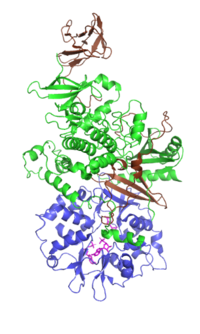
Geniposide protects pancreatic β cells from high glucose‐mediated injury by activation of AMP‐activated protein kinase
Sign Up to like & getrecommendations! Published in 2017 at "Cell Biology International"
DOI: 10.1002/cbin.10758
Abstract: Our previous works indicated that geniposide could regulate glucose‐stimulated insulin secretion (GSIS), and improved chronic high glucose‐induced dysfunctions in pancreatic β cells, but the molecular mechanisms remain largely unknown. In the present study, we investigated… read more here.
Keywords: activated protein; high glucose; pancreatic cells; injury ... See more keywords

Geniposide inhibits glucolipotoxicity and cooperates with Txnip knockdown to potentiate cell adaption to endoplasmic reticulum stress in pancreatic beta cells
Sign Up to like & getrecommendations! Published in 2020 at "Cell Biology International"
DOI: 10.1002/cbin.11350
Abstract: Thioredoxin‐interacting protein (Txnip), a negative regulator of thioredoxin, has become an attractive therapeutic target to alleviate metabolic diseases. Our previous data demonstrated that geniposide improved glucose‐stimulated insulin secretion by accelerating Txnip degradation and prevented the… read more here.
Keywords: inhibits glucolipotoxicity; geniposide inhibits; pancreatic cells; cell ... See more keywords

Gypenoside A attenuates dysfunction of pancreatic β cells by activating PDX1 signal transduction via the inhibition of miR‐150‐3p both in vivo and in vitro
Sign Up to like & getrecommendations! Published in 2022 at "Journal of Biochemical and Molecular Toxicology"
DOI: 10.1002/jbt.23004
Abstract: Saponin gypenoside A (GP) has shown its potential to handle diabetes mellitus. MicroRNA‐150‐3p (miR‐150‐3p) is closely related to the dysfunction of pancreatic β cells by targeting PDX1. Given the function of GP is related to… read more here.
Keywords: dysfunction pancreatic; pancreatic cells; expression; dysfunction ... See more keywords

Involvement of P2Y signaling in the restoration of glucose-induced insulin exocytosis in pancreatic β cells exposed to glucotoxicity.
Sign Up to like & getrecommendations! Published in 2021 at "Journal of cellular physiology"
DOI: 10.1002/jcp.30564
Abstract: Purinergic P2Y receptors, by binding adenosine triphosphate (ATP), are known for enhancing glucose-stimulated insulin secretion (GSIS) in pancreatic β cells. However, the impact of these receptors in the actin dynamics and insulin granule exocytosis in… read more here.
Keywords: insulin; gsis; p2y; pancreatic cells ... See more keywords

Persistent coxsackievirus B4 infection induces microRNA dysregulation in human pancreatic cells
Sign Up to like & getrecommendations! Published in 2017 at "Cellular and Molecular Life Sciences"
DOI: 10.1007/s00018-017-2567-0
Abstract: Enterovirus infections are implicated in the development of type 1 diabetes (T1D). MicroRNAs as regulators of gene expression are involved in many physiological and pathological processes. Given that viral infections dysregulate cellular microRNAs, we investigated… read more here.
Keywords: persistent coxsackievirus; human pancreatic; expression; coxsackievirus infection ... See more keywords

Sargassum sagamianum extract protects INS-1 pancreatic β cells against high glucose-induced apoptosis
Sign Up to like & getrecommendations! Published in 2019 at "Cytotechnology"
DOI: 10.1007/s10616-019-00295-5
Abstract: This study investigated the protective effects of Sargassum sagamianum extract (SSE) on INS-1 pancreatic β cells against high glucose-induced oxidative stress and apoptosis. Treatment with glucose at high concentrations (30 mM) caused β cell apoptosis, whereas… read more here.
Keywords: apoptosis; treatment; cells high; high glucose ... See more keywords

ATP mediates a negative autocrine signal on stimulus-secretion coupling in mouse pancreatic β-cells
Sign Up to like & getrecommendations! Published in 2018 at "Endocrine"
DOI: 10.1007/s12020-018-1731-0
Abstract: PurposeThe role of ATP, which is secreted by pancreatic β-cells, is still a matter of debate. It has been postulated that extracellular ATP acts as a positive auto- or paracrine signal in β-cells amplifying insulin… read more here.
Keywords: secretion; atp; extracellular atp; signal ... See more keywords

Graphene quantum dots rescue protein dysregulation of pancreatic β-cells exposed to human islet amyloid polypeptide
Sign Up to like & getrecommendations! Published in 2019 at "Nano Research"
DOI: 10.1007/s12274-019-2520-7
Abstract: The amyloid aggregation of peptides and proteins is a hallmark of neurological disorders and type 2 diabetes. Human islet amyloid polypeptide (IAPP), co-secreted with insulin by pancreatic β-cells, plays dual roles in both glycemic control… read more here.
Keywords: protein expression; islet amyloid; amyloid; human islet ... See more keywords

Physiology of pancreatic β-cells: Ion channels and molecular mechanisms implicated in stimulus-secretion coupling.
Sign Up to like & getrecommendations! Published in 2021 at "International review of cell and molecular biology"
DOI: 10.1016/bs.ircmb.2021.02.006
Abstract: The human and mouse islet of Langerhans is an endocrine organ composed of five different cells types; insulin-secreting β-cells, glucagon-producing α-cells, somatostatin-producing δ-cells, pancreatic polypeptide-secreting PP cells and ɛ-cells that secretes ghrelin. The most important… read more here.
Keywords: secretion; ion channels; implicated stimulus; physiology ... See more keywords

Long non-coding RNA-regulated pathways in pancreatic β cells: Their role in diabetes.
Sign Up to like & getrecommendations! Published in 2021 at "International review of cell and molecular biology"
DOI: 10.1016/bs.ircmb.2021.02.007
Abstract: Long non-coding RNAs (lncRNAs) are transcripts of more than 200 nucleotides that have not coding potential, but act as gene expression regulators through several molecular mechanisms. Several studies have identified tons of lncRNAs that are… read more here.
Keywords: pancreatic cell; long non; non coding; pancreatic cells ... See more keywords

Casein kinase 2 phosphorylates and stabilizes C/EBPβ in pancreatic β cells.
Sign Up to like & getrecommendations! Published in 2018 at "Biochemical and biophysical research communications"
DOI: 10.1016/j.bbrc.2018.02.108
Abstract: During the development of type 2 diabetes, endoplasmic reticulum (ER) stress leads to pancreatic β cell failure. CCAAT/enhancer-binding protein (C/EBP) β is highly induced by ER stress and AMP-activated protein kinase (AMPK) suppression in pancreatic… read more here.
Keywords: ebp pancreatic; phosphorylates stabilizes; stabilizes ebp; pancreatic cells ... See more keywords